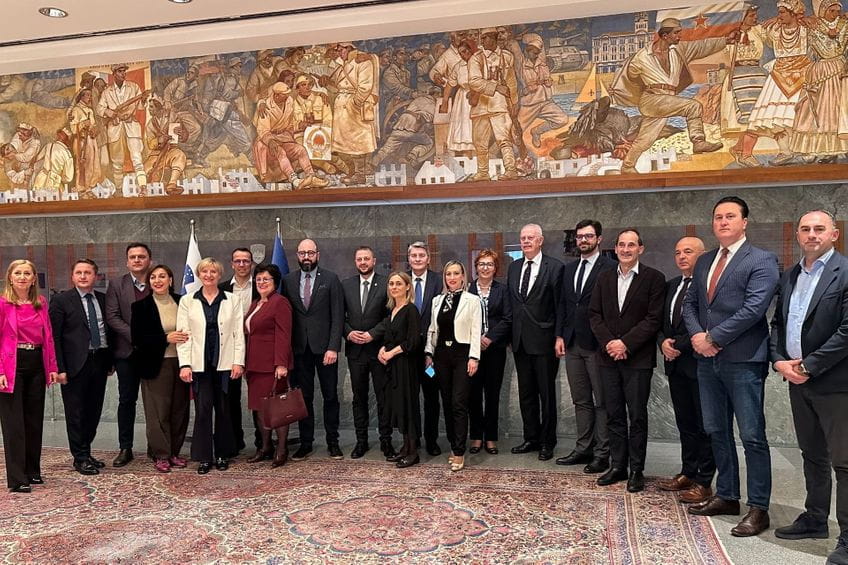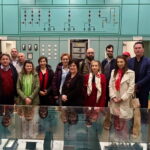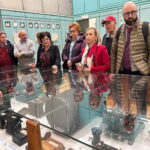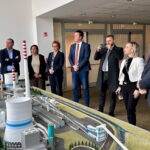GREEN PARLIAMENTARY GROUP IN STUDY VISIT TO SLOVENIA
The Green parliamentary group of the 28th convocation of the Parliament of Montenegro participated in a study visit to Slovenia from April 7 to 9, to encourage the exchange of best practices in the energy field. The visit represents a joint activity of parliamentarians from Montenegro and Bosnia and Herzegovina by the Memorandum on Cooperation between the Green Parliamentary Group of the Parliament of Montenegro and the Green Club of the Parliament of Bosnia and Herzegovina.
During the two-day study visit, the delegation met with members of the Parliament of Slovenia and made several important visits, during which Mr. Janez Kopač provided expert support to the Green parliamentary groups.
The MPs were on a tour of the most modern thermal power plant in Europe – TE Šoštanj (TEŠ), during which they had the opportunity to get to know how TEŠ went through different phases of operation. After ecological reconstruction and as a result of economic unsustainability due to the high prices of CO2 certificates, TEŠ is currently facing a struggle for survival, but also the certain future of shutting down in 2027, which is significantly earlier than the projected working life that was planned until 2054. Alternative projects were presented that TEŠ plans to launch through the EU just transition process to reconstruct the energy location and the region, namely by building a solar power plant on the technical lake of the thermal power plant, producing hydrogen, and introducing biomass district heating.
During the exchange of experiences, the deputies were interested in whether the coal mine will also be closed with the closure of TEŠ, whether the alternative purpose of the existing facilities is being considered, how the retraining of employees is carried out, whether analyzes have been made on the impact of shutting down TEŠ on the price of electricity for households and businesses, especially when taking into account the announced introduction of CBAM, etc.
At a meeting with members of the Parliament of Slovenia, representatives of the Green parliamentary groups from Montenegro and Bosnia and Herzegovina discussed the key challenges they face in the process of ongoing European energy integration.
In front of the delegation of the Green parliamentary groups, the vice-president of the Parliament of Montenegro, Zdenka Popović, emphasized that the meeting represents an additional platform for strengthening cooperation and that it is particularly significant because it is being organized after the recently formed Friendship Group of the Parliament of Montenegro with the Parliament of Slovenia, and thus reflects the continuation of joint action in the field of energy.
The delegations of the Green parliamentary groups also visited the hydroelectric power plants on the Soča River, with a special focus on HPP Doblar I and II. The key role of balanced energy in the energy system was highlighted, and that is precisely why European policies are moving in the direction of building batteries. Given that pumped hydro power plants are also gaining more and more value because of this, parliamentarians had the opportunity to see how the Avče pumped hydro power plant in Slovenia works in practice.
* * *
Representatives of the Green parliamentary group of the Parliament of Montenegro, during the study visit to Ljubljana, were: Zdenka Popović, Branka Marković, Slađana Kaluđerović, Darko Dragović and Artan Ćobi, as well as Tijana Knežević, secretary of the Green parliamentary group.
Representatives of the Parliament of Slovenia at the meeting were: Meira Hot, Vice-President of the Parliament of Slovenia, Miroslav Gregorič, Deputy President of the Committee for Infrastructure, Environment and Spatial Planning, and Alma Intihar, President of the Parliamentary Friendship Group with Bosnia and Herzegovina.
Support for capacity development of the Green Parliamentary Groups of the Western Balkans is part of the Open Regional Fund for South-Eastern Europe – Energy, Transport and Climate Protection (ORF-ETC) program, which is implemented by the Deutsche Gesellschaft für Internationale Zusammenarbeit GmbH (GIZ) together with the Network of Schools of Political Studies from the Western Balkans, on behalf of the German Federal Ministry for Economic Cooperation and Development (BMZ) and co-financed by the EU.








